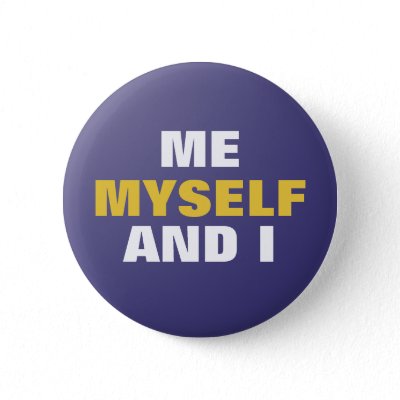Last week we discussed subjective (used as subject) and objective (used as object) pronouns. If you are one who is unsure of whether to say “Then she gave it to her and I” or “Then she gave it to her and me,” go back and read those last two posts for help.
I want to continue with the pronoun theme, but discuss the use of myself. This actually trips me up more often than I care to admit, and I study grammar and writing on a daily basis!
First of all, myself, yourself, and ourselves are pronouns known as reflexive pronouns. That is, they reflect back to the antecedent (a noun or pronoun earlier in the sentence).
When we say that Donna is the antecedent to herself in the sentence “Donna gave herself a pat on the back,” we are saying that herself is a pronoun and Donna is the antecedent (the word that herself refers back to).
So, reflexive pronouns reflect or refer back to another word. They cannot be used alone (i.e. myself can not be used without a noun or pronoun earlier in the sentence (as its antecedent).
1. I bought myself some candy. (Myself refers back to/is reflexive of I.)
2. Donna bought herself some candy. (Herself refers back to/is reflexive of Donna.)
3. He looked at himself in the mirror. (Himself refers back to/is reflexive of He.)
The key to understanding and using reflexive pronouns is to not use them by themselves!
Thus, you wouldn’t say the following:
1. Ray and myself went to town. (There is no noun for myself to refer back to. You need the subjective I in this sentence…Ray and I.)
2. They gave it to him and myself. (Same thing—no noun or pronoun for myself to refer back to.)


